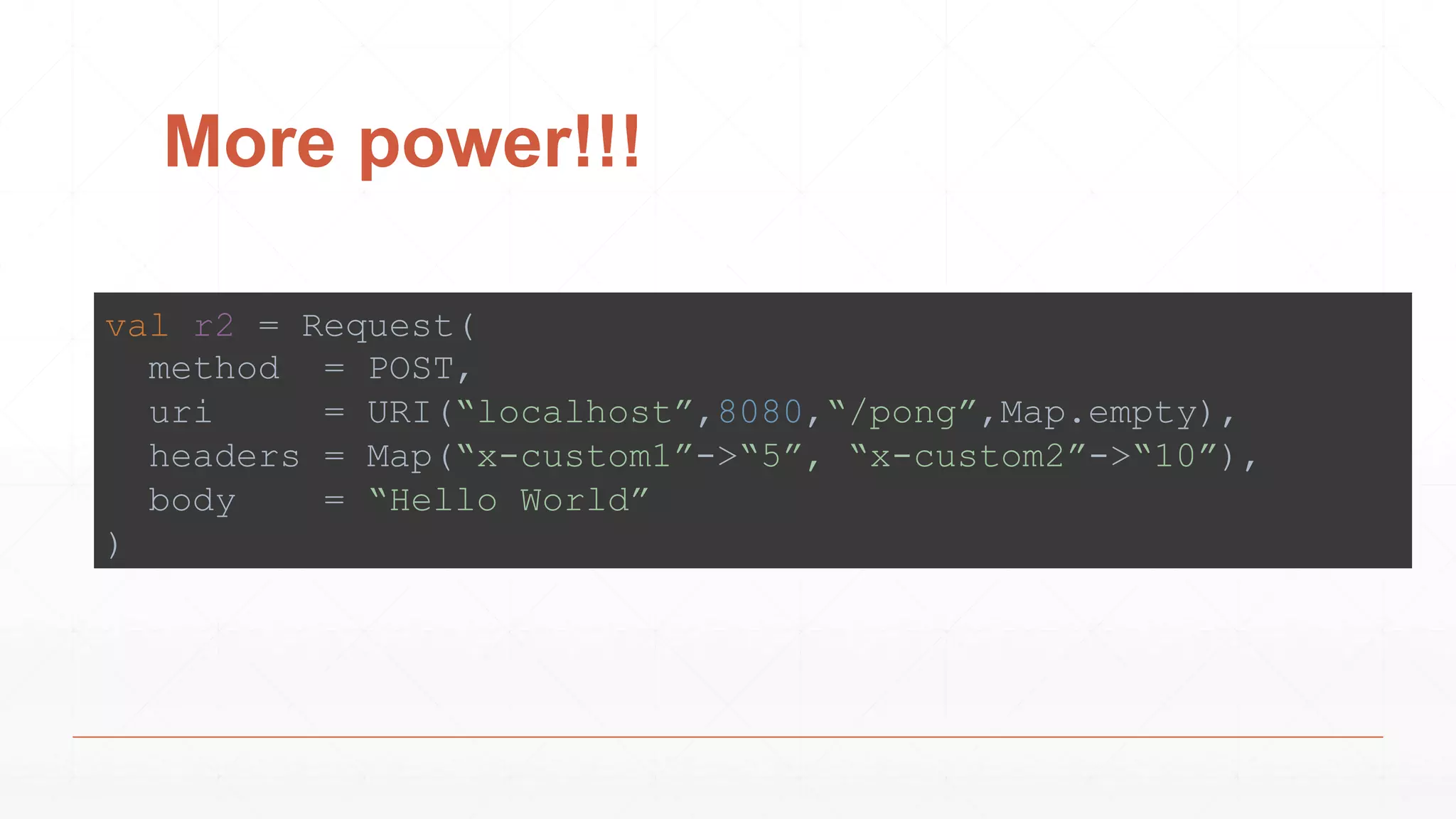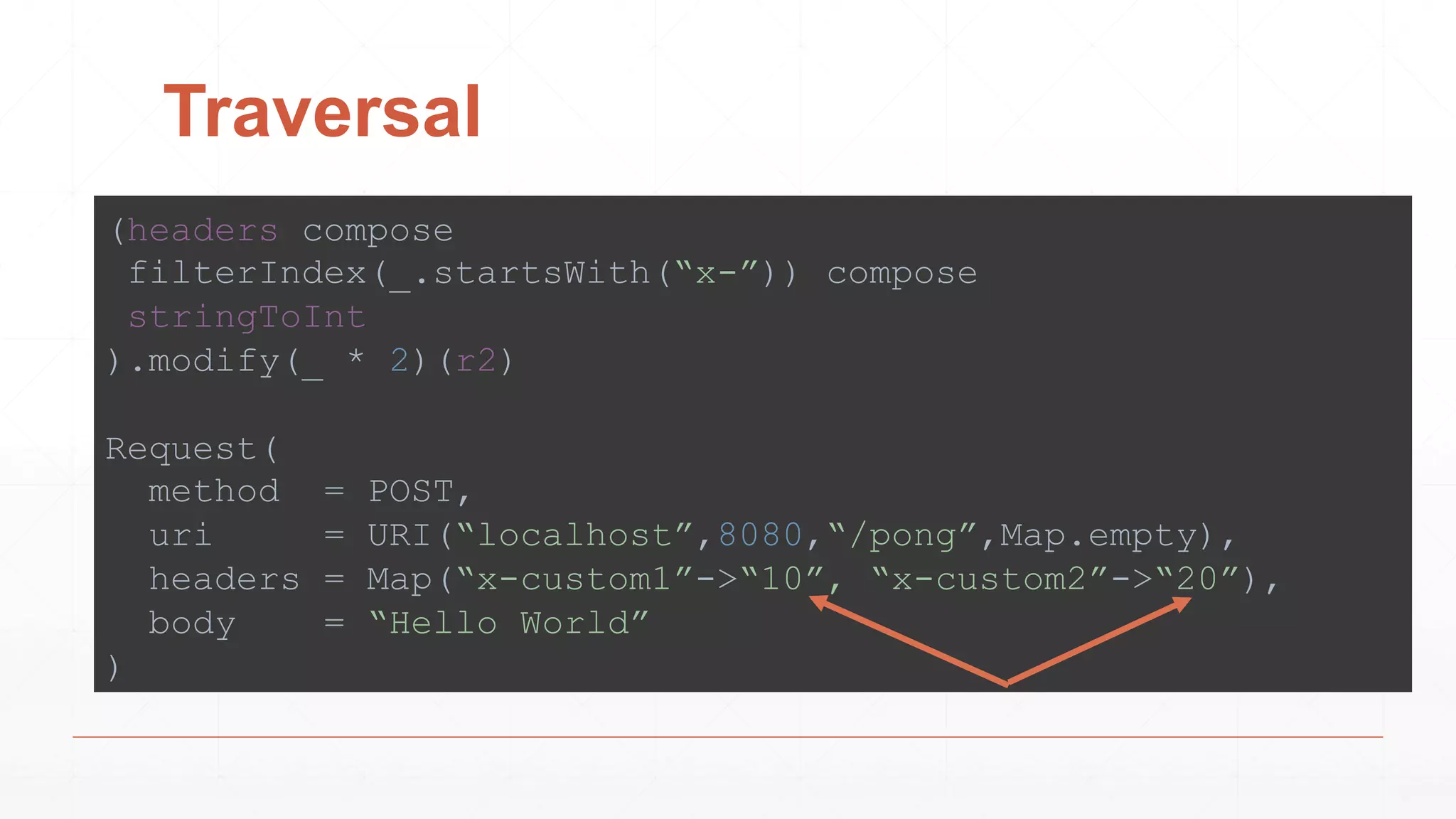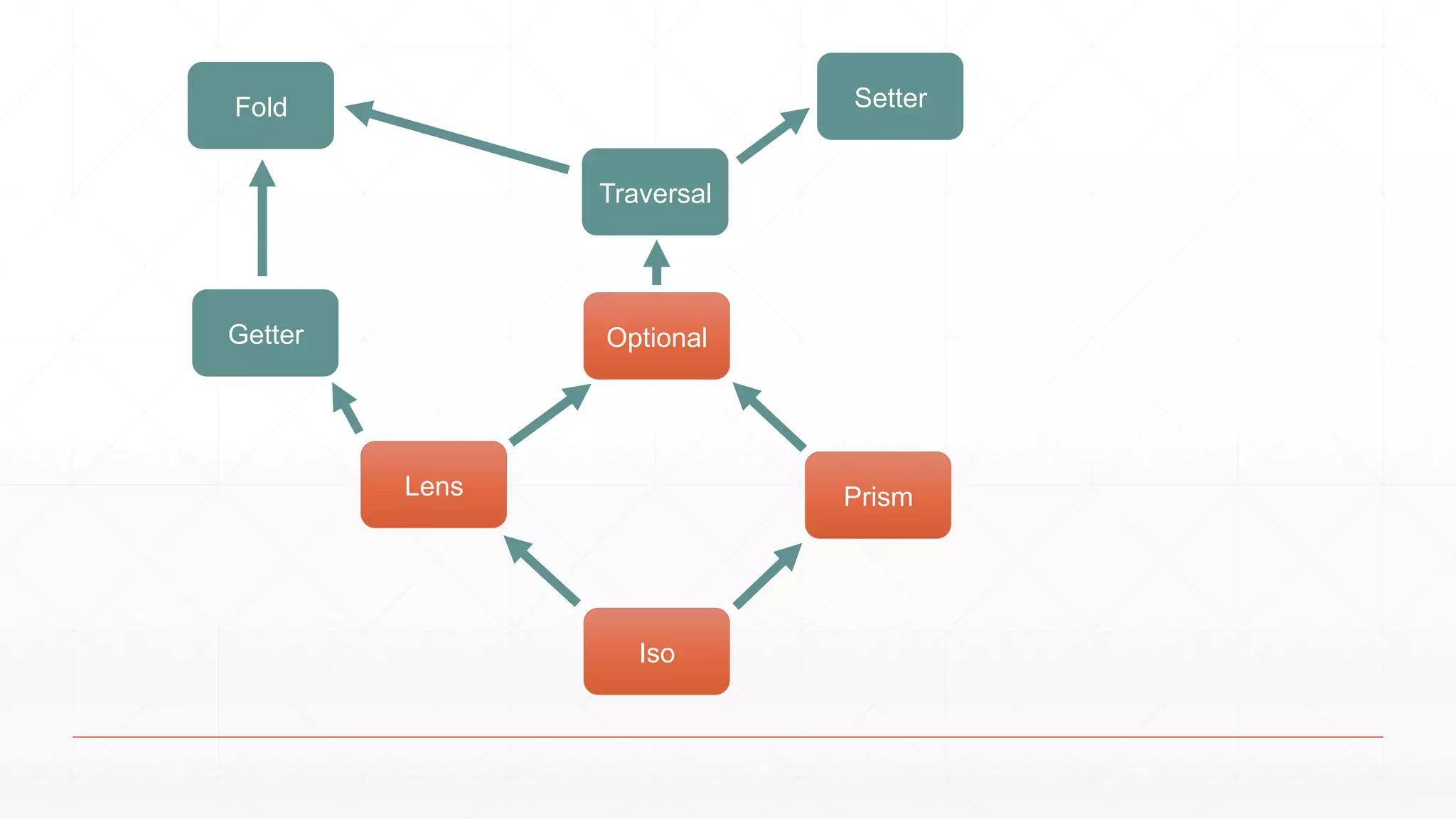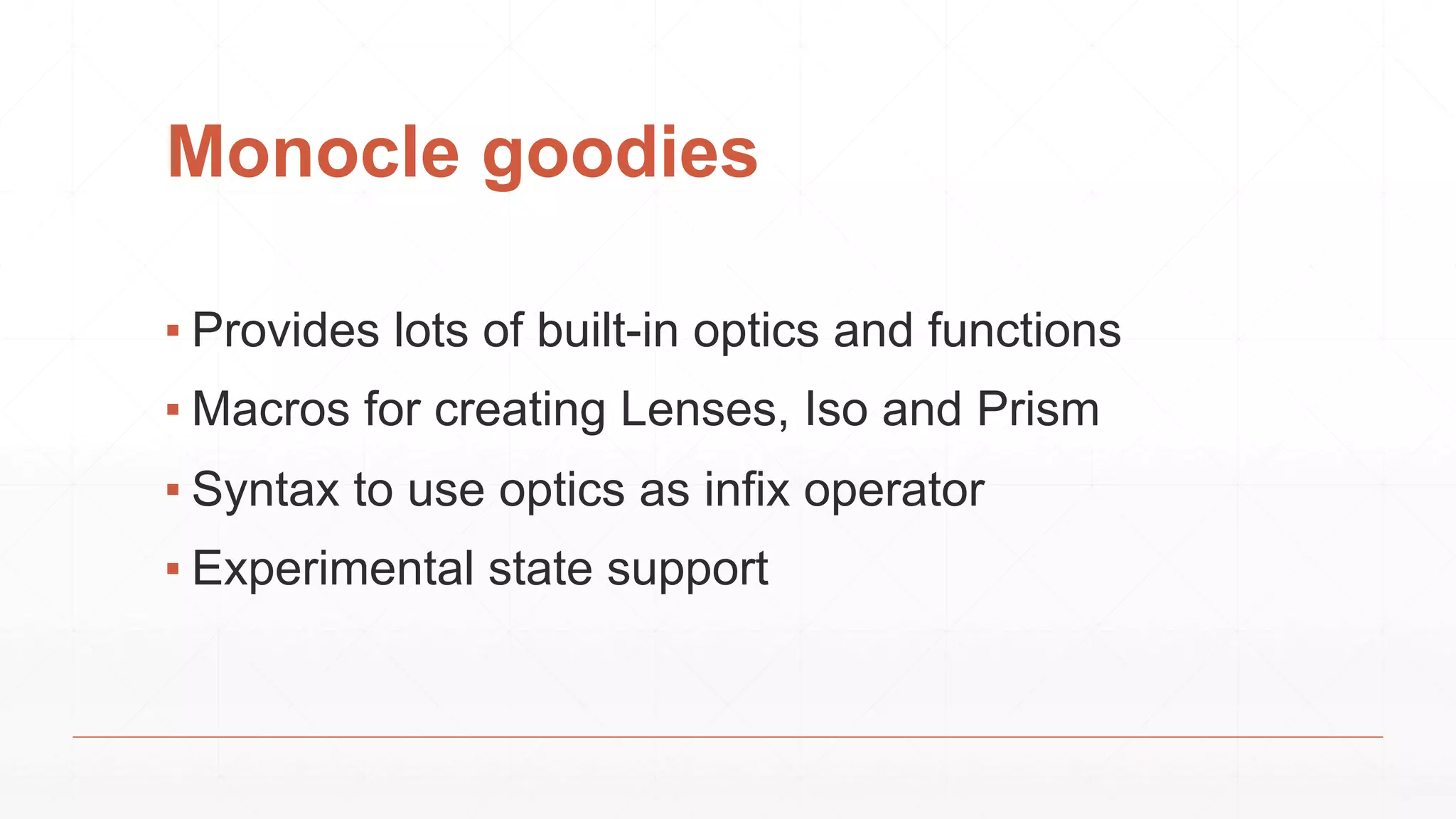The document discusses Scala optics including isomorphisms, prisms, and lenses, detailing their definitions, properties, and derived methods. It provides examples on how these types can be implemented to perform safe unit conversions and data manipulations in data structures such as lists, maps, and requests. Additionally, it references the use of libraries like Monocle for enhanced functionality and ease of use in functional programming paradigms.
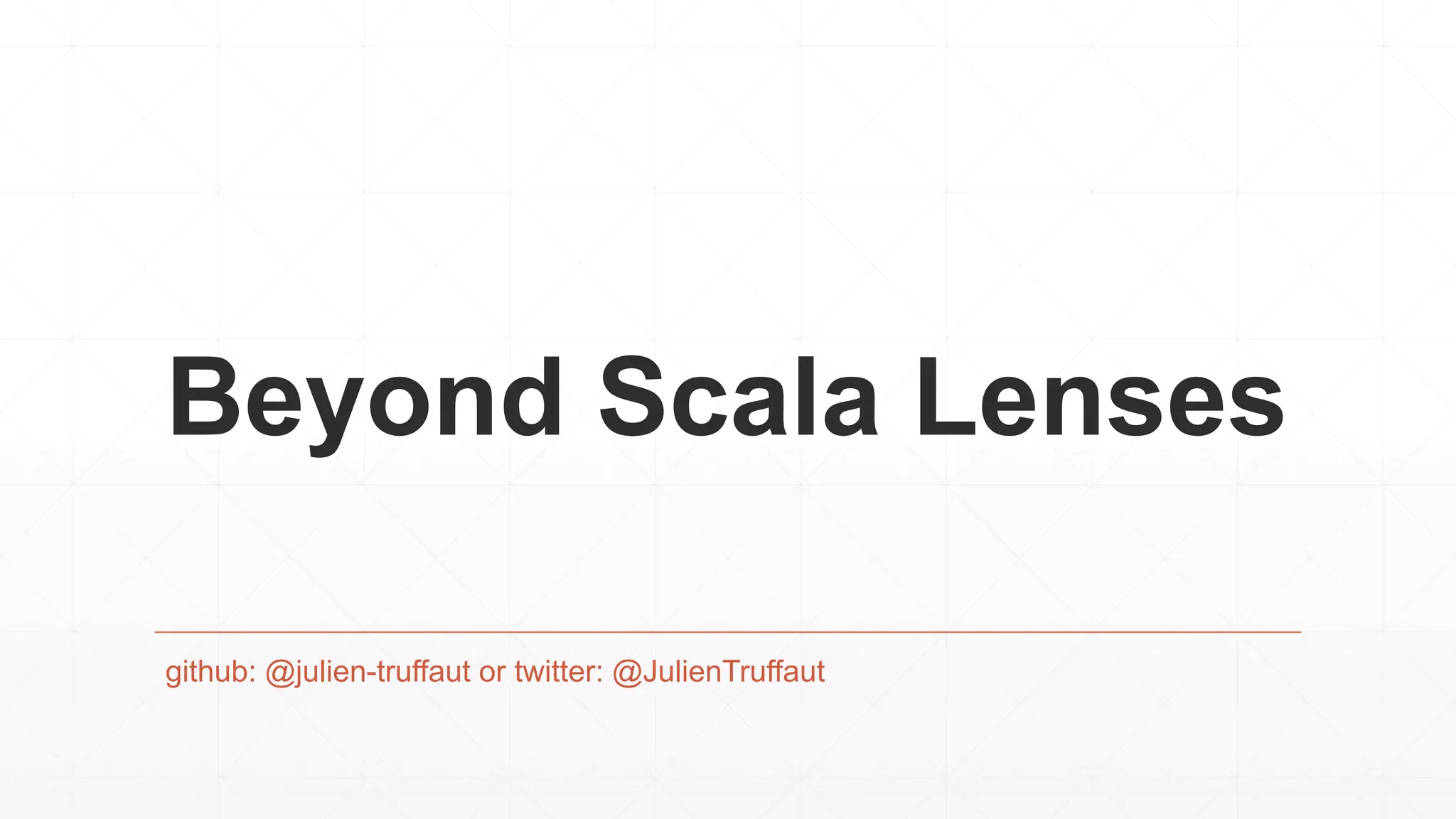
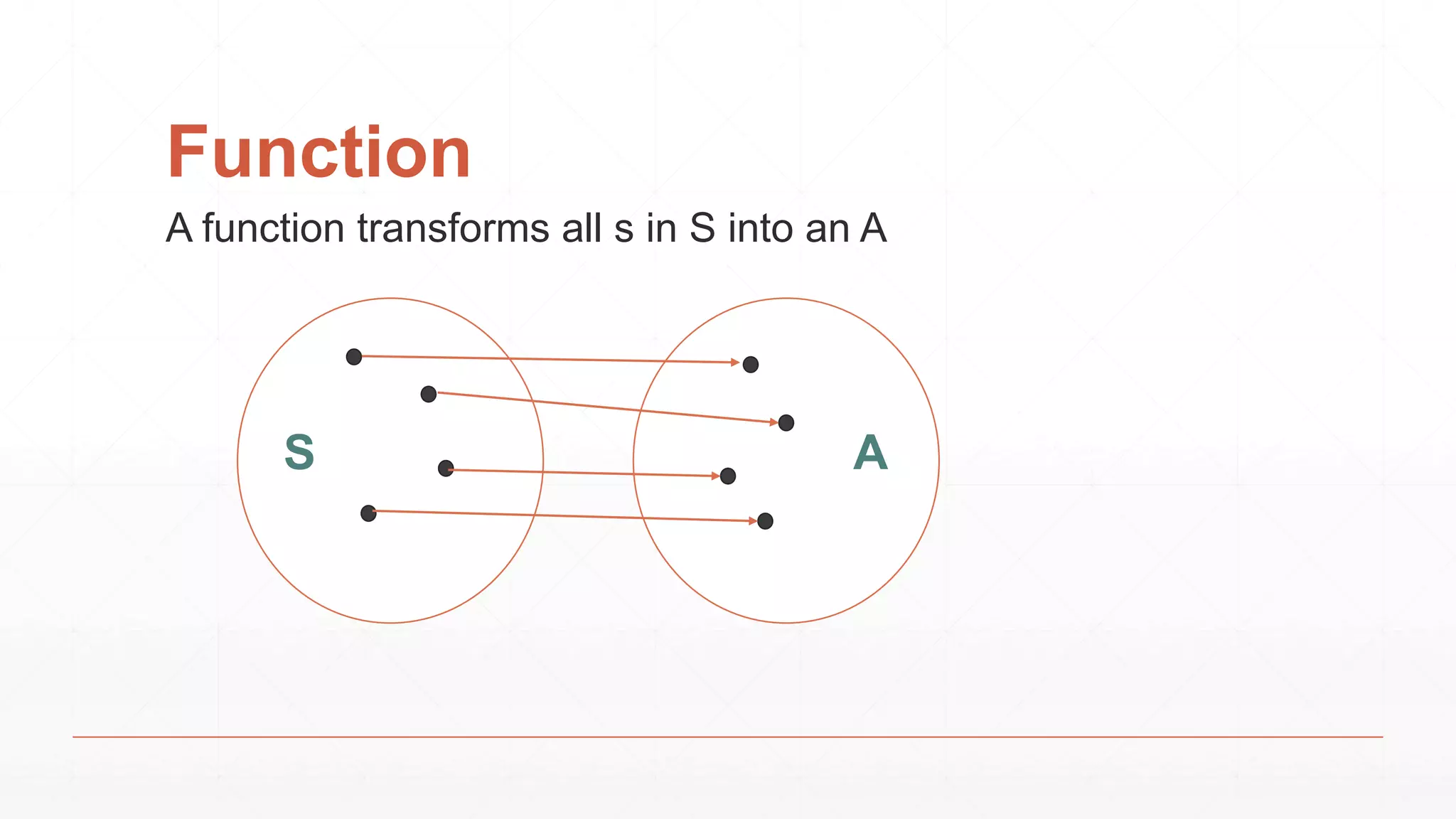
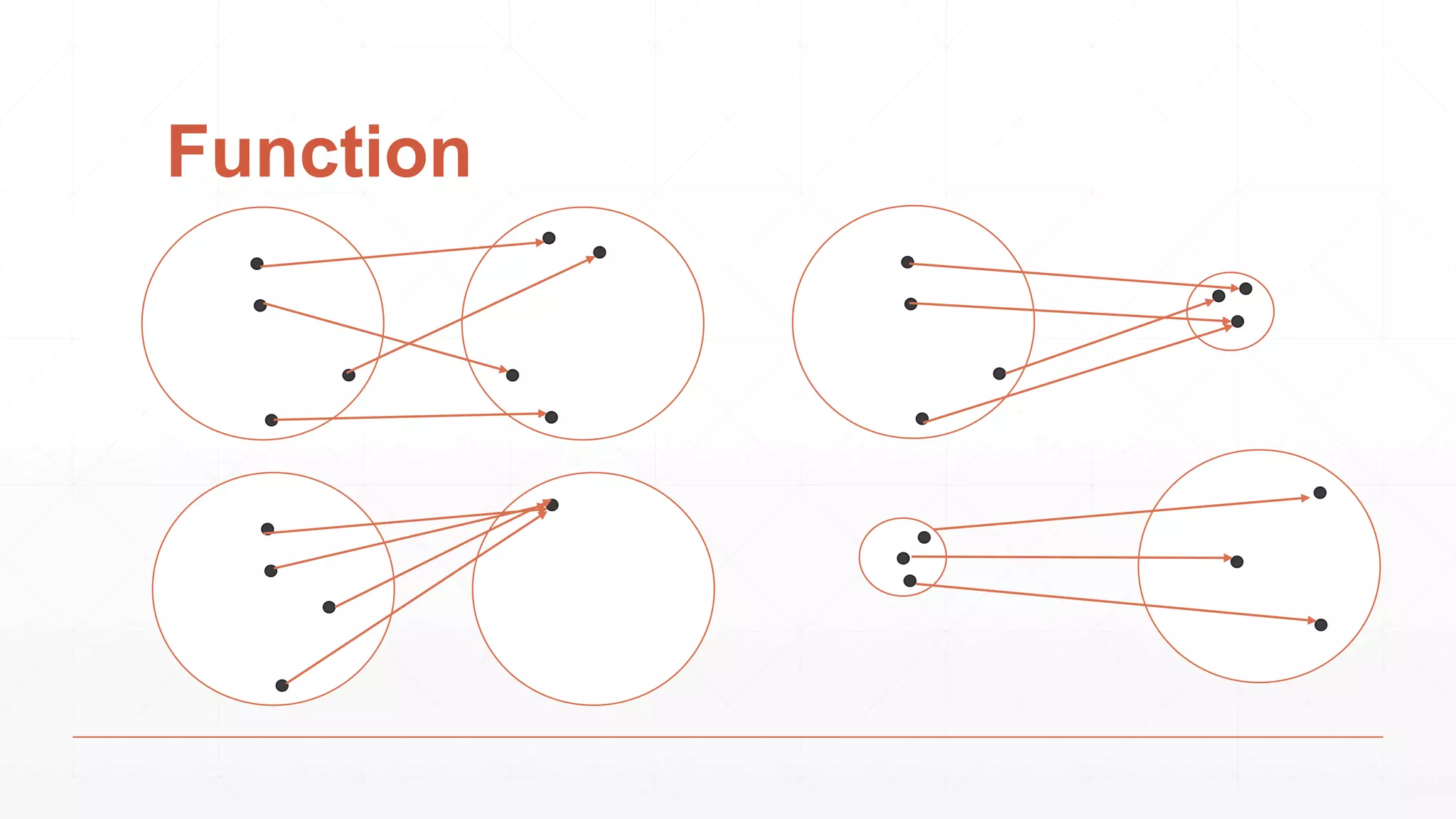
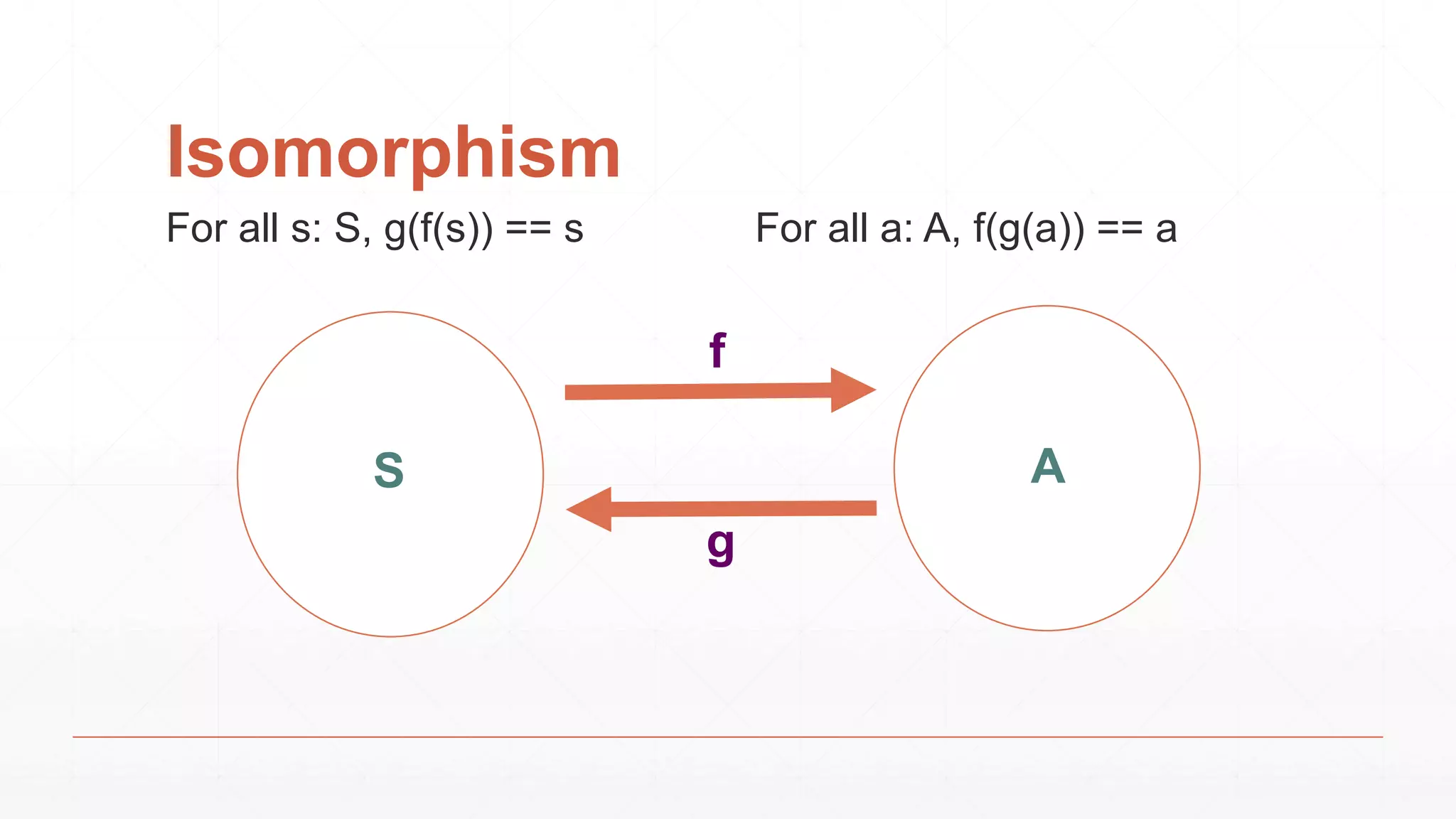

Properties:
For all s: S, reverseGet(get(s)) == s
For all a: A, get(reverseGet(a)) == a](https://image.slidesharecdn.com/beyondscalalens-150312020754-conversion-gate01/75/Beyond-Scala-Lens-5-2048.jpg)
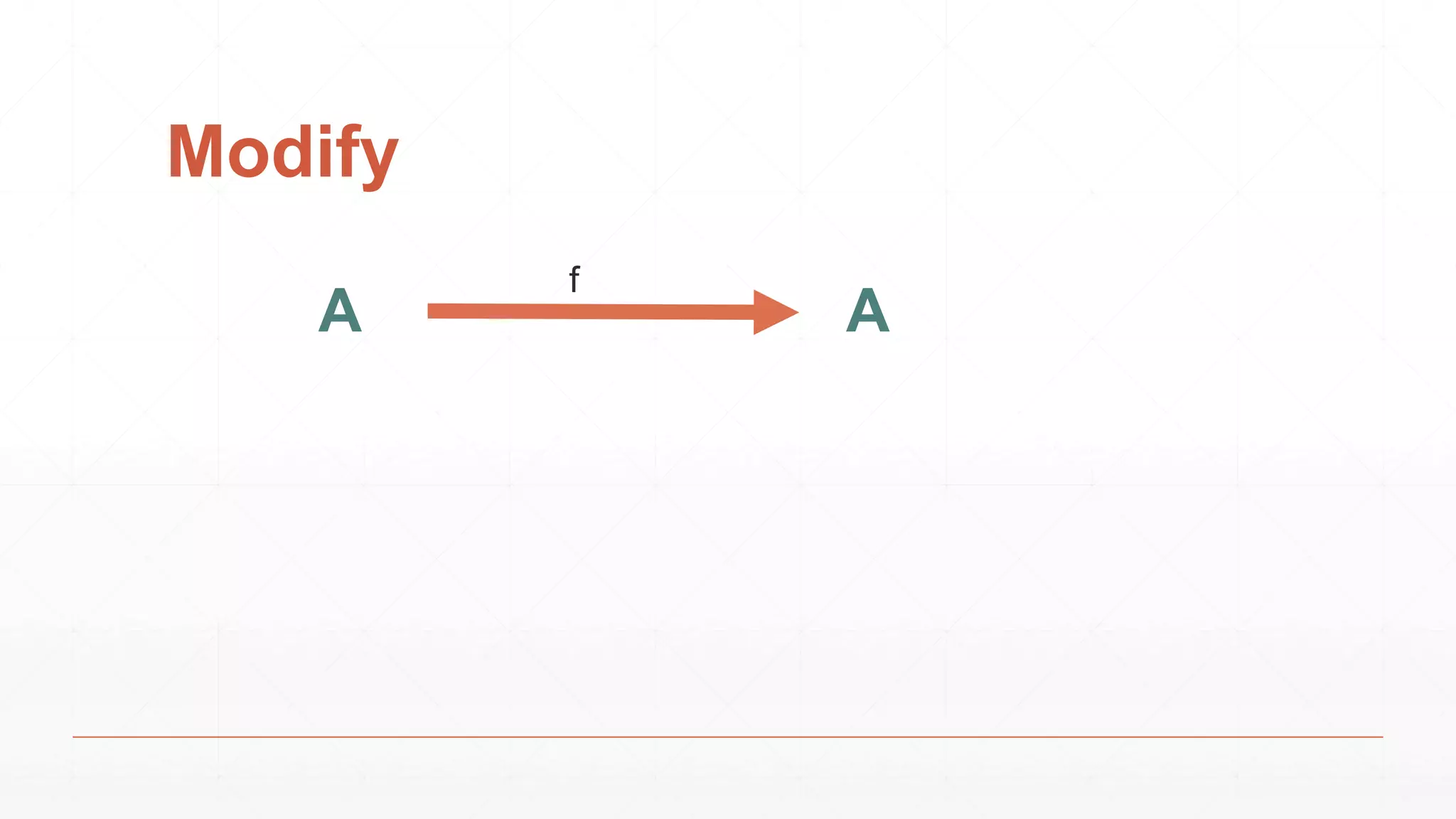
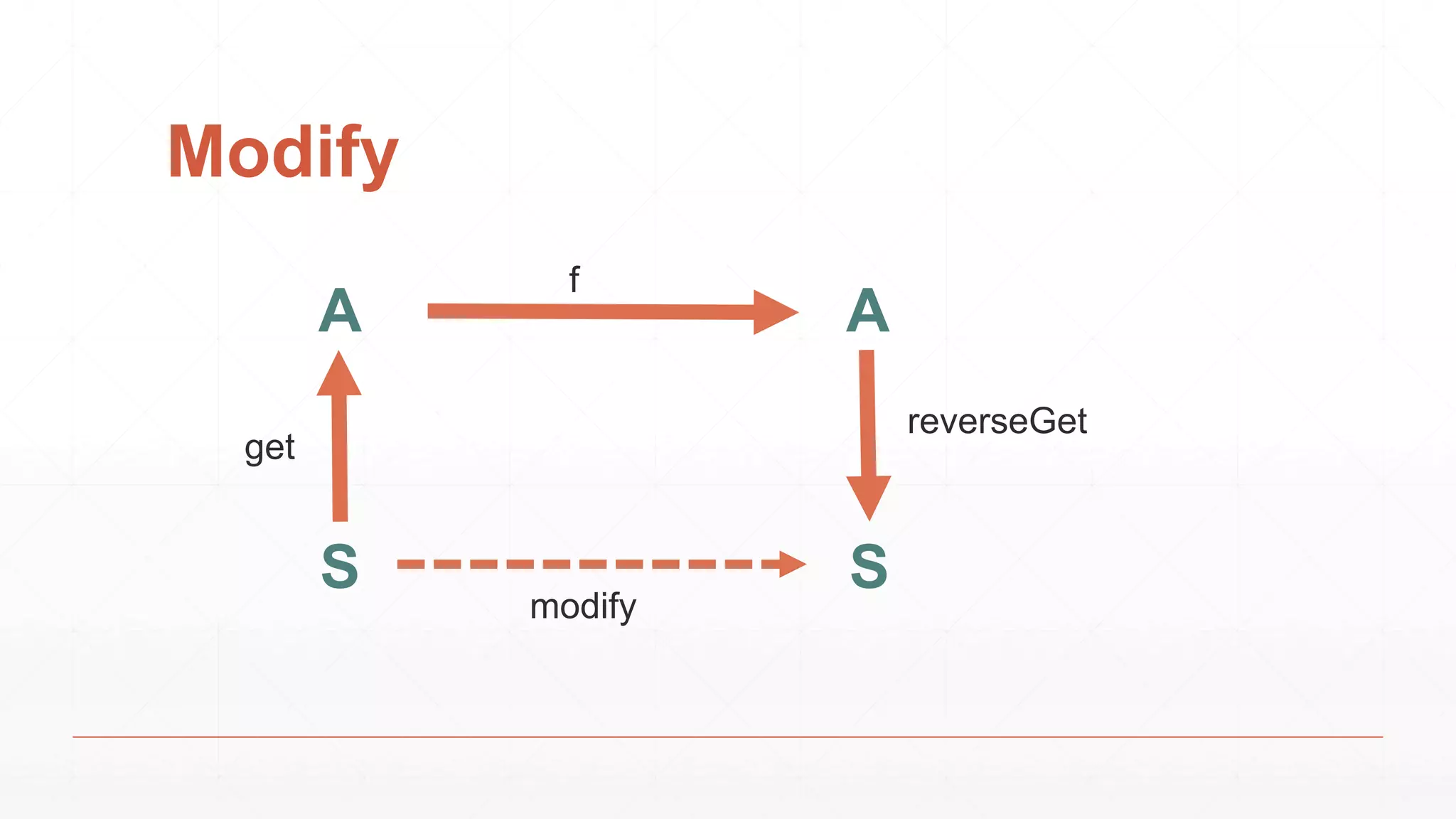
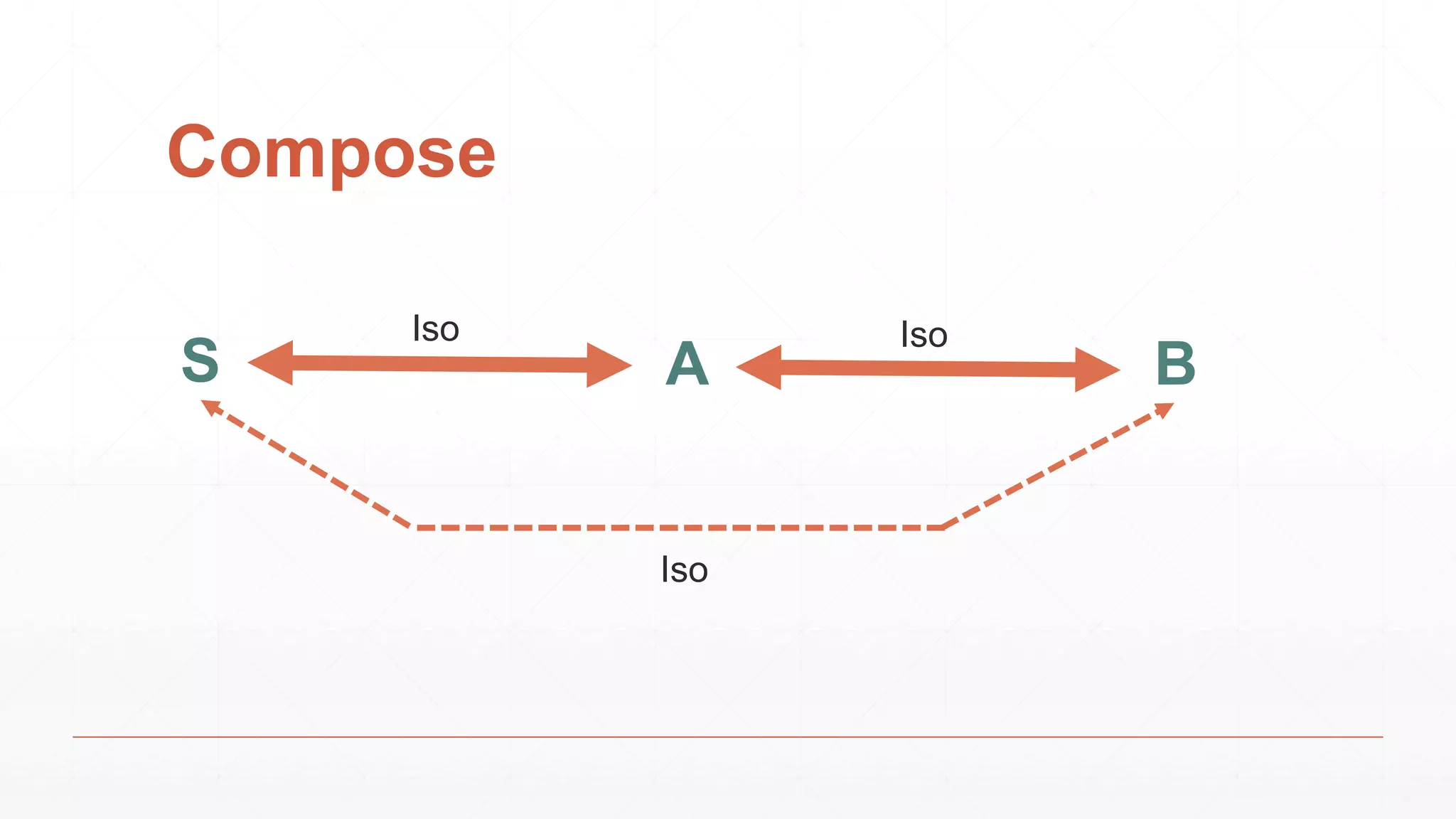
{
def modify(m: A => A): S => S
def reverse: Iso[A,S]
def compose[B](other: Iso[A,B]): Iso[S,B]
}](https://image.slidesharecdn.com/beyondscalalens-150312020754-conversion-gate01/75/Beyond-Scala-Lens-9-2048.jpg)
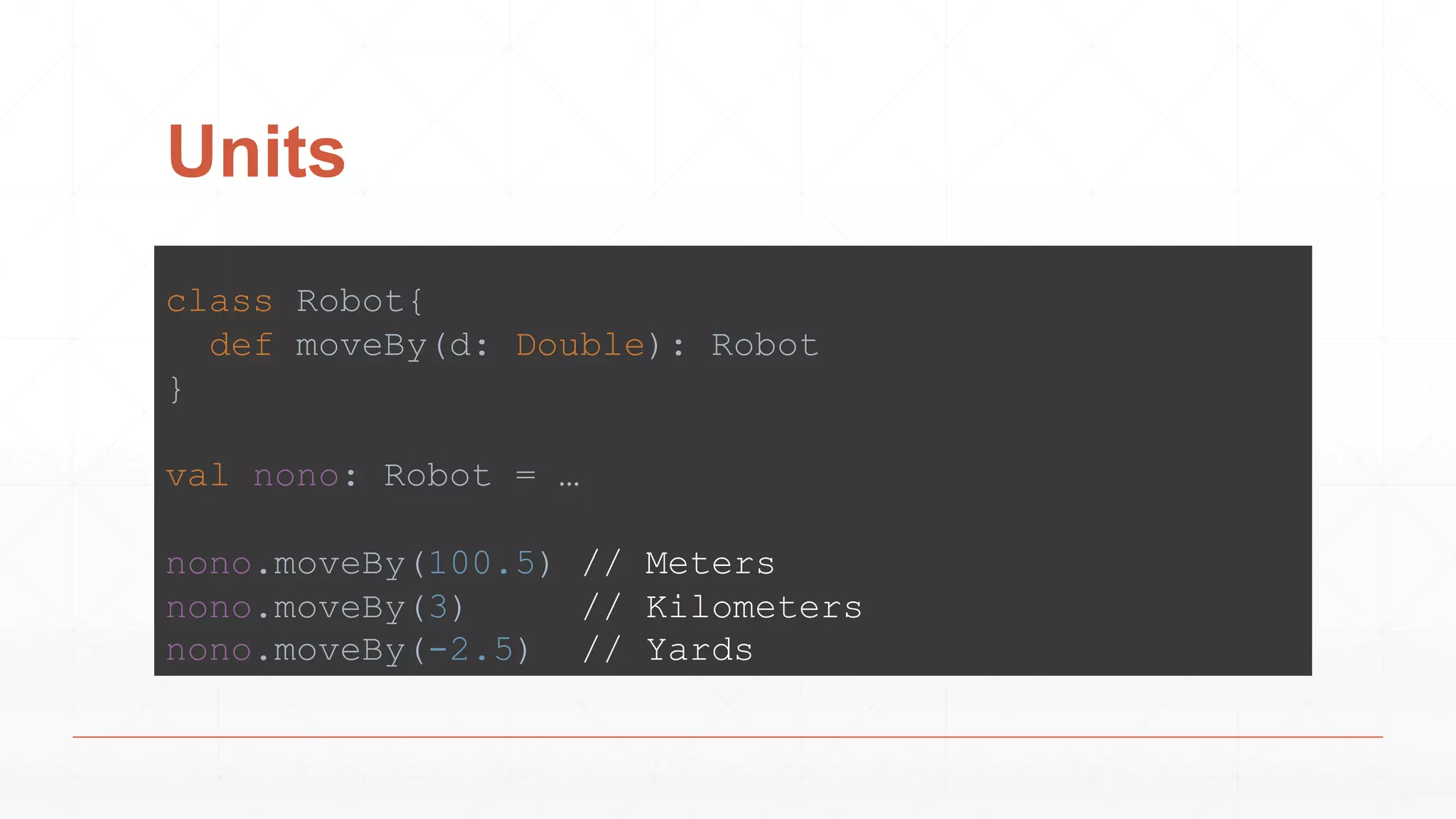
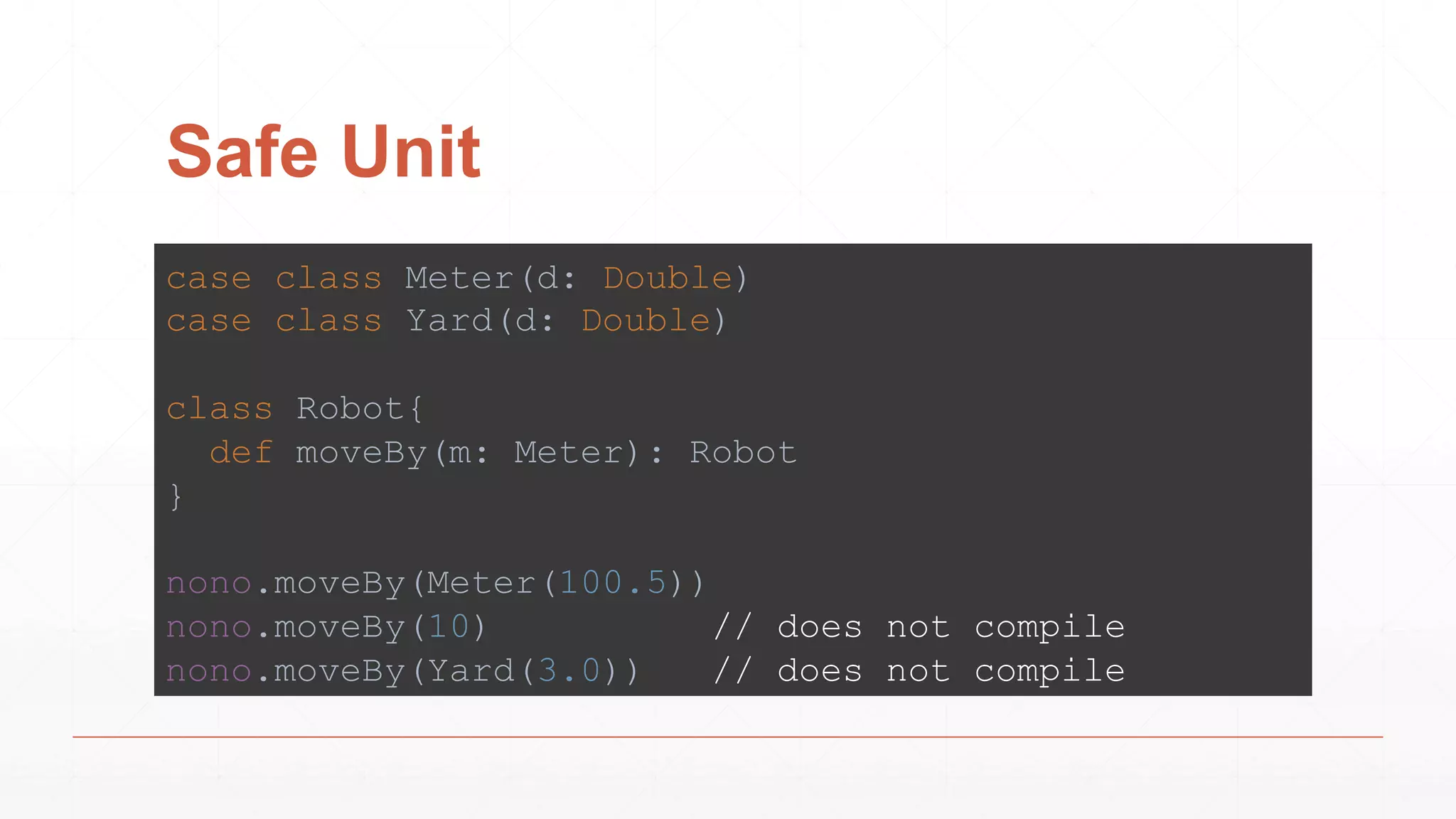
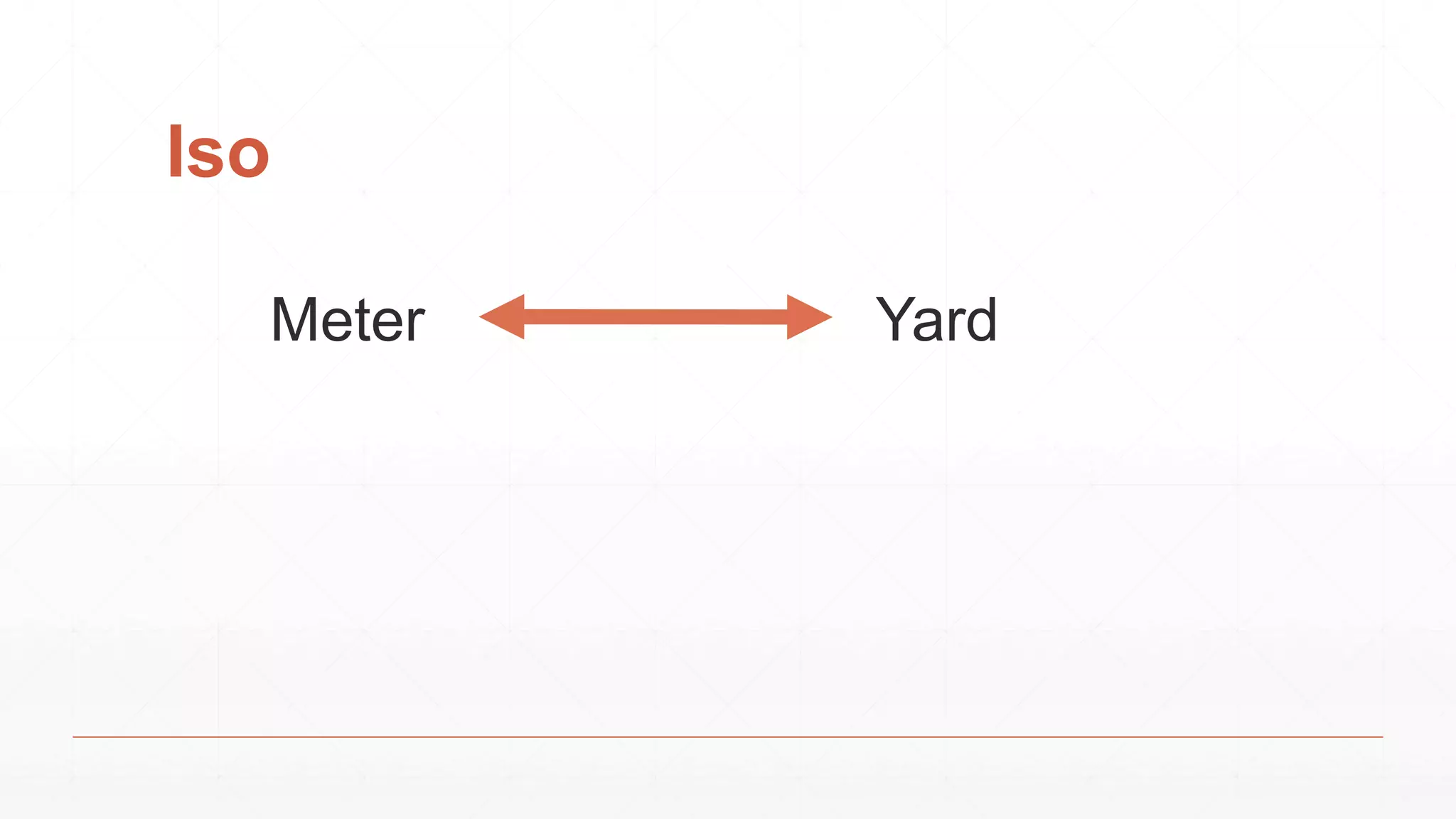
![Meter to Yard
val meterToYard: Iso[Meter, Yard] = Iso(
m => Yard(m.value * 1.09361),
y => Meter(y.value / 1.09361)
)
meterToYard.get(Meter(200)) == Yard(218.7219999…)
nono.moveBy(meterToYard.reverseGet(Yard(2.5))](https://image.slidesharecdn.com/beyondscalalens-150312020754-conversion-gate01/75/Beyond-Scala-Lens-13-2048.jpg)
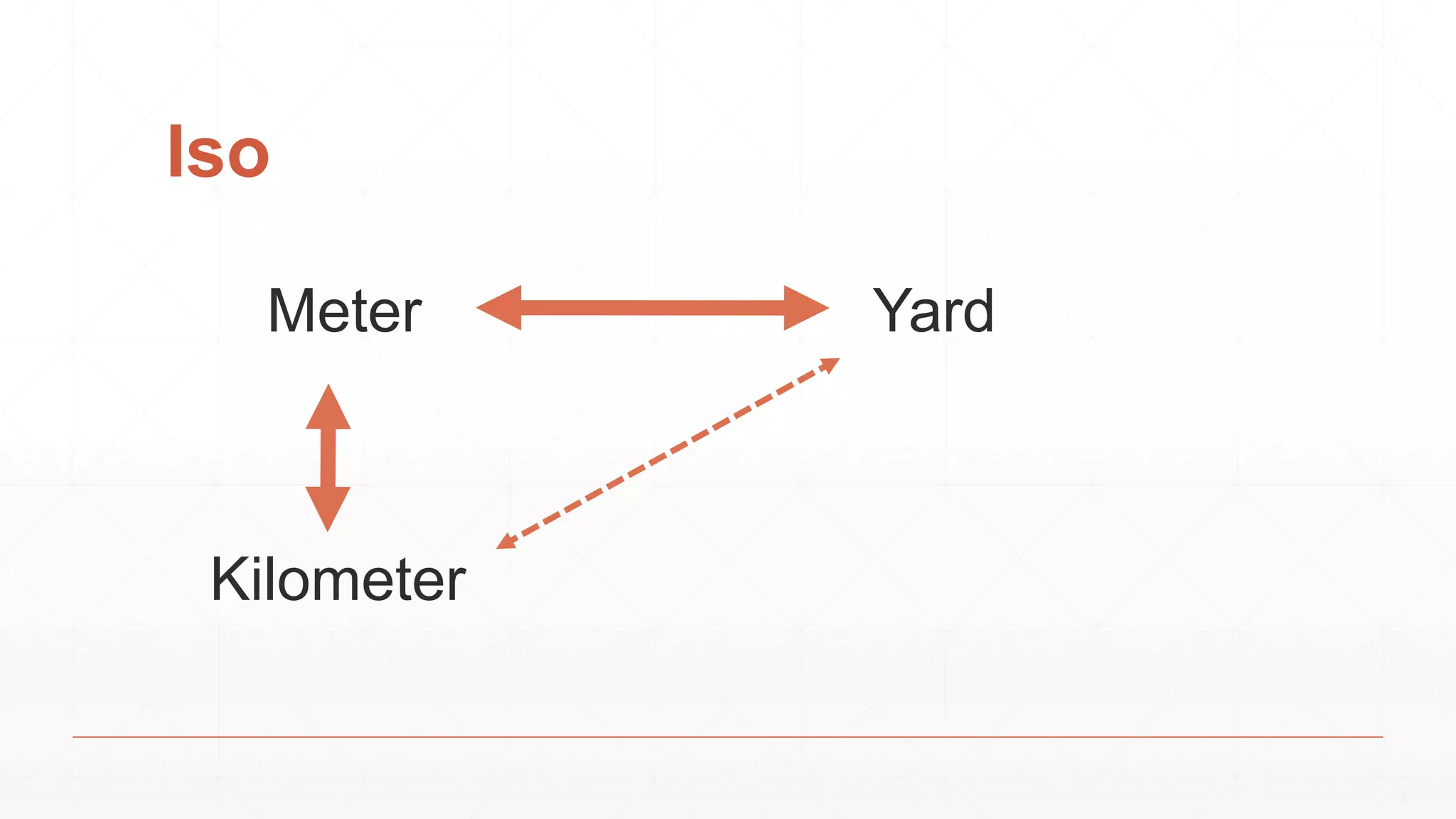
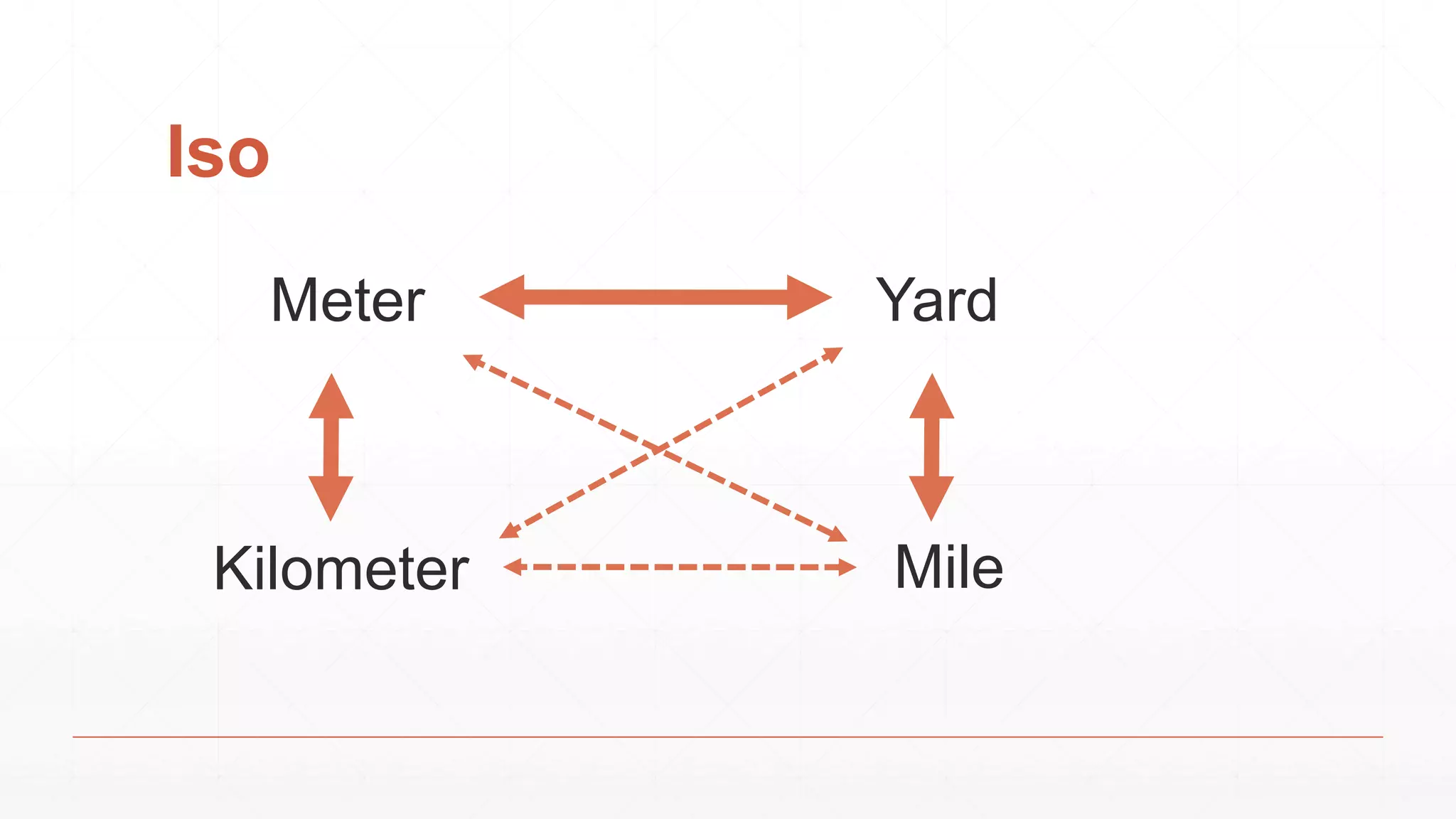
![Iso Composition
case class Kilometer(value: Double)
case class Mile(value: Double)
val meterToKilometer: Iso[Meter, Kilometer] = …
val yardToMile : Iso[Yard, Mile] = …
val kilometerToMile: Iso[Kilometer, Mile] =
meterToKilometer.reverse compose
meterToYard compose
yardToMile](https://image.slidesharecdn.com/beyondscalalens-150312020754-conversion-gate01/75/Beyond-Scala-Lens-16-2048.jpg)
![Different Representation
val stringToList: Iso[String, List[Char]] =
Iso(_.toList, _.mkString(“”))
def listToVector[A]: Iso[List[A], Vector[A]] =
Iso(_.toVector, _.toList)](https://image.slidesharecdn.com/beyondscalalens-150312020754-conversion-gate01/75/Beyond-Scala-Lens-17-2048.jpg)
![Generic Programming
case object Red
val red: Iso[Red, Unit] = Iso(Red => (), () => Red)
case class Person(name: String, age: Int)
val personToTuple: Iso[Person, (String, Int)] = …](https://image.slidesharecdn.com/beyondscalalens-150312020754-conversion-gate01/75/Beyond-Scala-Lens-18-2048.jpg)
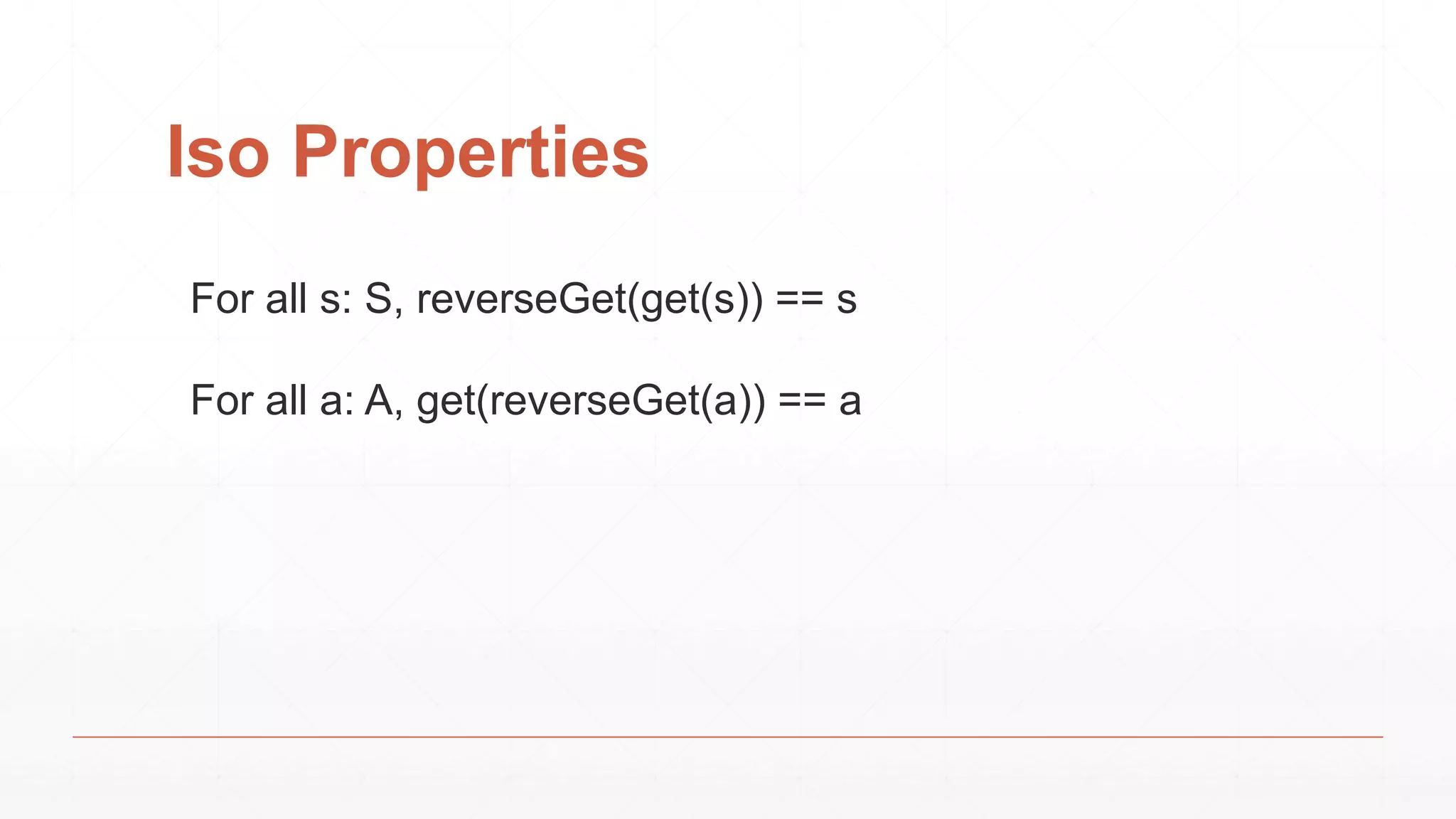
 = new Properties {
property(“One Way”) = forAll { s: S =>
iso.reverseGet(iso.get(s)) == s
}
property(“Other Way”) = forAll { a: A =>
iso.get(iso.reverseGet(a)) == a
}
}](https://image.slidesharecdn.com/beyondscalalens-150312020754-conversion-gate01/75/Beyond-Scala-Lens-20-2048.jpg)
![Scalacheck
import org.spec2.scalaz.Spec
class IsoSpec extends Spec {
checkAll(“meter to yard”, isoLaws(meterToYard))
}
val meterToYard: Iso[Meter, Yard] = Iso(
m => Yard(m.value * 1.09361),
y => Meter(y.value / 1.09361)
)](https://image.slidesharecdn.com/beyondscalalens-150312020754-conversion-gate01/75/Beyond-Scala-Lens-21-2048.jpg)
![Scalacheck
A counter-example is:
[Yard(1.518707721E9)] (after 24 tries)
scala> meterToYard.get(meterToYard.reverseGet(
Yard(1.518707721E9)))
scala> res0: Yard= Yard(1.5187077210000002E9)](https://image.slidesharecdn.com/beyondscalalens-150312020754-conversion-gate01/75/Beyond-Scala-Lens-22-2048.jpg)
![Relaxed Isomorphism
S
A
For all s: S such as f(s) exists, g(f(s)) == s
For all a: A, f(g(a)) == a
?
f
g
f is a Function[S, Option[A]]
g is a Function[A, S]](https://image.slidesharecdn.com/beyondscalalens-150312020754-conversion-gate01/75/Beyond-Scala-Lens-23-2048.jpg)

Properties:
For all s: S, getOption(s) map reverseGet == Some(s) || None
For all a: A, getOption(reverseGet(a)) == Some(a)](https://image.slidesharecdn.com/beyondscalalens-150312020754-conversion-gate01/75/Beyond-Scala-Lens-24-2048.jpg)
![Pattern matching / Constructor
sealed trait List[A]
case class Cons[A](h: A, t: List[A]) extends List[A]
case class Nil[A]() extends List[A]
Cons.unapply(List(1,2,3)) == Some((1, List(2,3)))
Cons.unapply(Nil) == None
Cons.apply(1, List(2,3)) == List(1,2,3)](https://image.slidesharecdn.com/beyondscalalens-150312020754-conversion-gate01/75/Beyond-Scala-Lens-25-2048.jpg)
![Prism
sealed trait List[A]
case class Cons[A](h: A, t: List[A]) extends List[A]
case class Nil[A]() extends List[A]
def cons[A]: Prism[List[A], (A, List[A])] = …
cons.getOption(List(1,2,3)) == Some((1, List(2,3)))
cons.getOption(Nil) == None
cons.reverseGet(1, List(2,3)) == List(1,2,3)](https://image.slidesharecdn.com/beyondscalalens-150312020754-conversion-gate01/75/Beyond-Scala-Lens-26-2048.jpg)
{
def isMatching(s: S): Boolean
def modify(f: A => A): S=> S
def modifyOption(f: A => A): S => Option[S]
def compose[B](other: Prism[A,B]): Prism[S,B]
def compose[B](other: Iso[A,B]): ???[S,B]
}](https://image.slidesharecdn.com/beyondscalalens-150312020754-conversion-gate01/75/Beyond-Scala-Lens-27-2048.jpg)
![Iso – Prism
Optic f g
Iso S => A A => S
Prism S => Option[A] A => S
def isoToPrism[S,A](iso: Iso[S,A]): Prism[S,A] =
Prism(
getOption = s => Some(iso.get(s)),
reverseGet = iso.reverseGet
)](https://image.slidesharecdn.com/beyondscalalens-150312020754-conversion-gate01/75/Beyond-Scala-Lens-28-2048.jpg)
![Iso – Prism
case class Prism[S,A]{
def compose[B](other: Prism[A,B]): Prism[S,B]
def compose[B](other: Iso[A,B]): Prism[S,B]
}
case class Iso[S,A]{
def compose[B](other: Iso[A,B]): Iso[S,B]
def compose[B](other: Prism[A,B]): Prism[S,B]
}](https://image.slidesharecdn.com/beyondscalalens-150312020754-conversion-gate01/75/Beyond-Scala-Lens-29-2048.jpg)
![Enum
sealed trait Day
case object Monday extends Day
case object Tuesday extends Day
val tuesday: Prism[Day, Unit] = …
tuesday.getOption(Monday) == None
tuesday.getOption(Tuesday) == Some(())
tuesday.reverseGet(()) == Tuesday](https://image.slidesharecdn.com/beyondscalalens-150312020754-conversion-gate01/75/Beyond-Scala-Lens-30-2048.jpg)
![Json
sealed trait Json
case class JNumber(v: Double) extends Json
case class JString(s: String) extends Json
val jNum: Prism[Json, Double] = …
jNum.modify(_ + 1)(JNumber(2.0)) == JNumber(3.0)
jNum.modify(_ + 1)(JString(“”)) == JString(“”)
jNum.modifyOption(_ + 1)(JString(“”)) == None](https://image.slidesharecdn.com/beyondscalalens-150312020754-conversion-gate01/75/Beyond-Scala-Lens-31-2048.jpg)
![Safe Down Casting
val doubleToInt: Prism[Double, Int] = …
doubleToInt.getOption(3.4) == None
doubleToInt.getOption(3.0) == Some(3)
doubleToInt.reverseGet(5) == 5.0](https://image.slidesharecdn.com/beyondscalalens-150312020754-conversion-gate01/75/Beyond-Scala-Lens-32-2048.jpg)
![Prism Composition
sealed trait Json
case class JNumber(v: Double) extends Json
case class JString(s: String) extends Json
val jInt: Prism[Json, Int] = jNum compose doubleToInt
jInt.getOption(JNumber(3.0)) == Some(3)
jInt.getOption(JNumber(5.9)) == None
jInt.getOption(JString(“”)) == None](https://image.slidesharecdn.com/beyondscalalens-150312020754-conversion-gate01/75/Beyond-Scala-Lens-33-2048.jpg)
![Where is the bug?
def stringToInt: Prism[String, Int] = Prism(
getOption = s => Try(s.toInt).toOption,
reverseGet = _.toString
)
stringToInt.modify(_ * 2)(“5”) == “10”
stringToInt.getOption(“5”) == Some(5)
stringToInt.getOption(“-3”) == Some(-3)
stringToInt.getOption(“5.7”) == None
stringToInt.getOption(“99999999999999999”) == None
stringToInt.getOption(“Hello”) == None](https://image.slidesharecdn.com/beyondscalalens-150312020754-conversion-gate01/75/Beyond-Scala-Lens-34-2048.jpg)
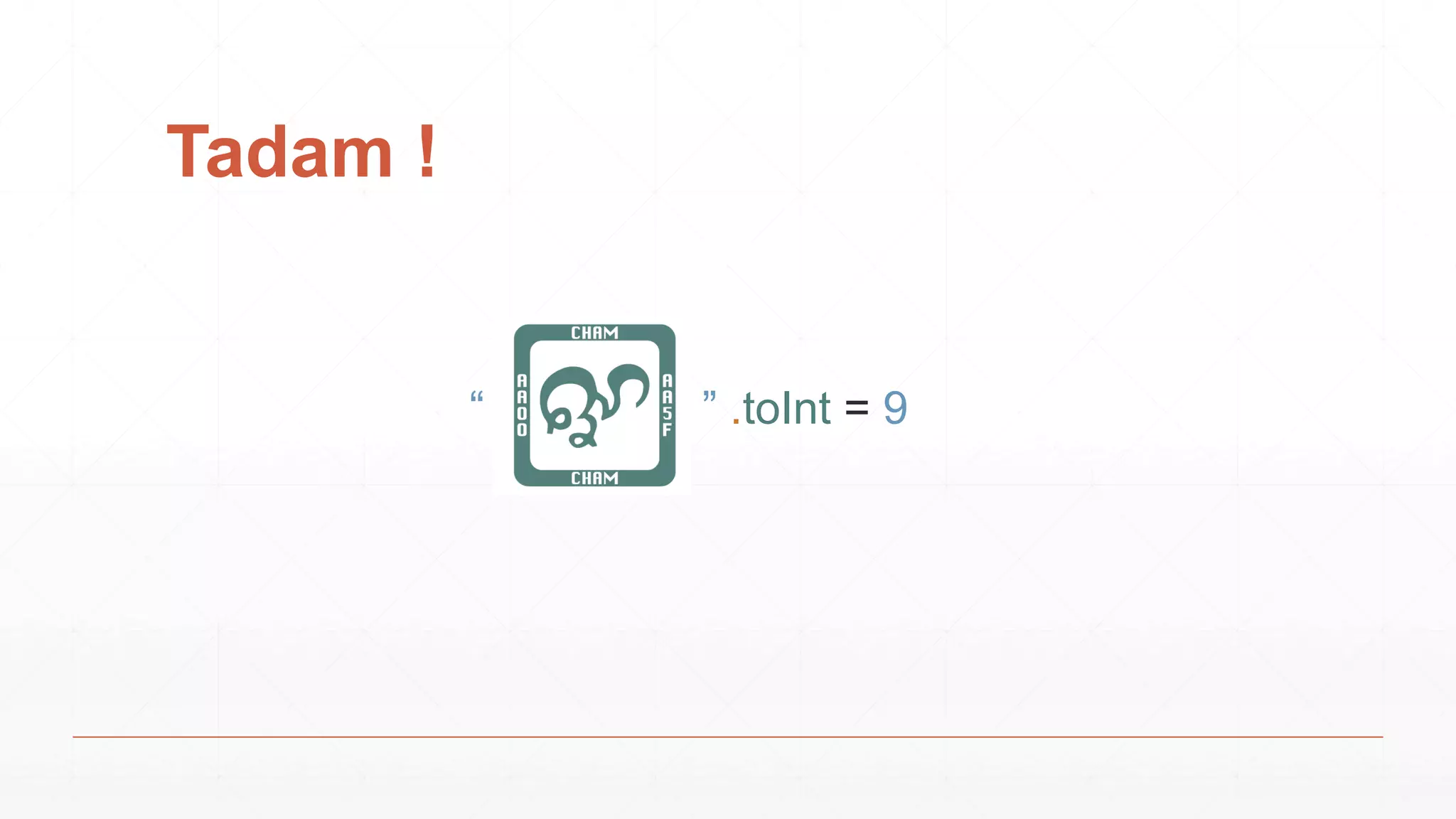
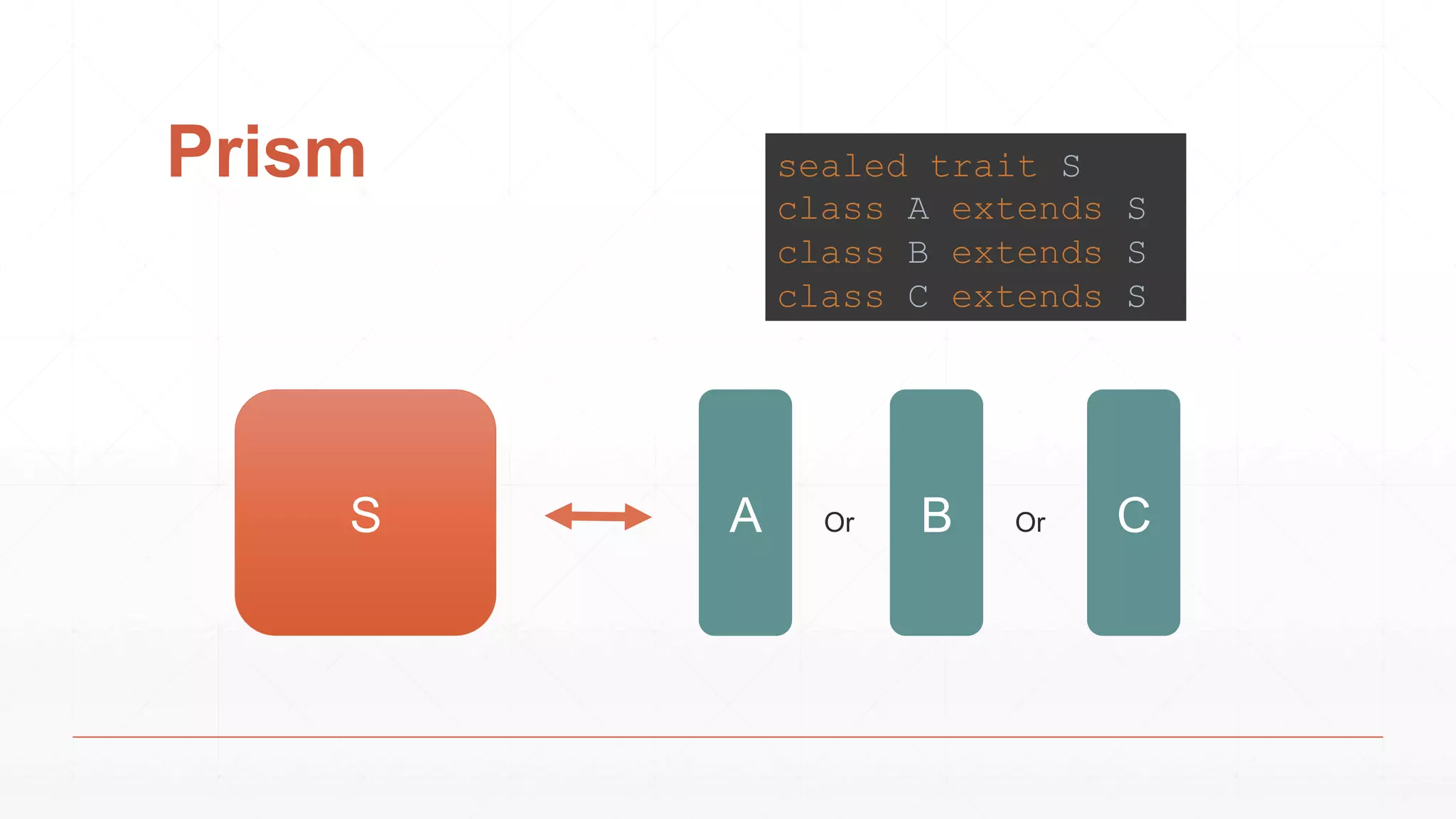
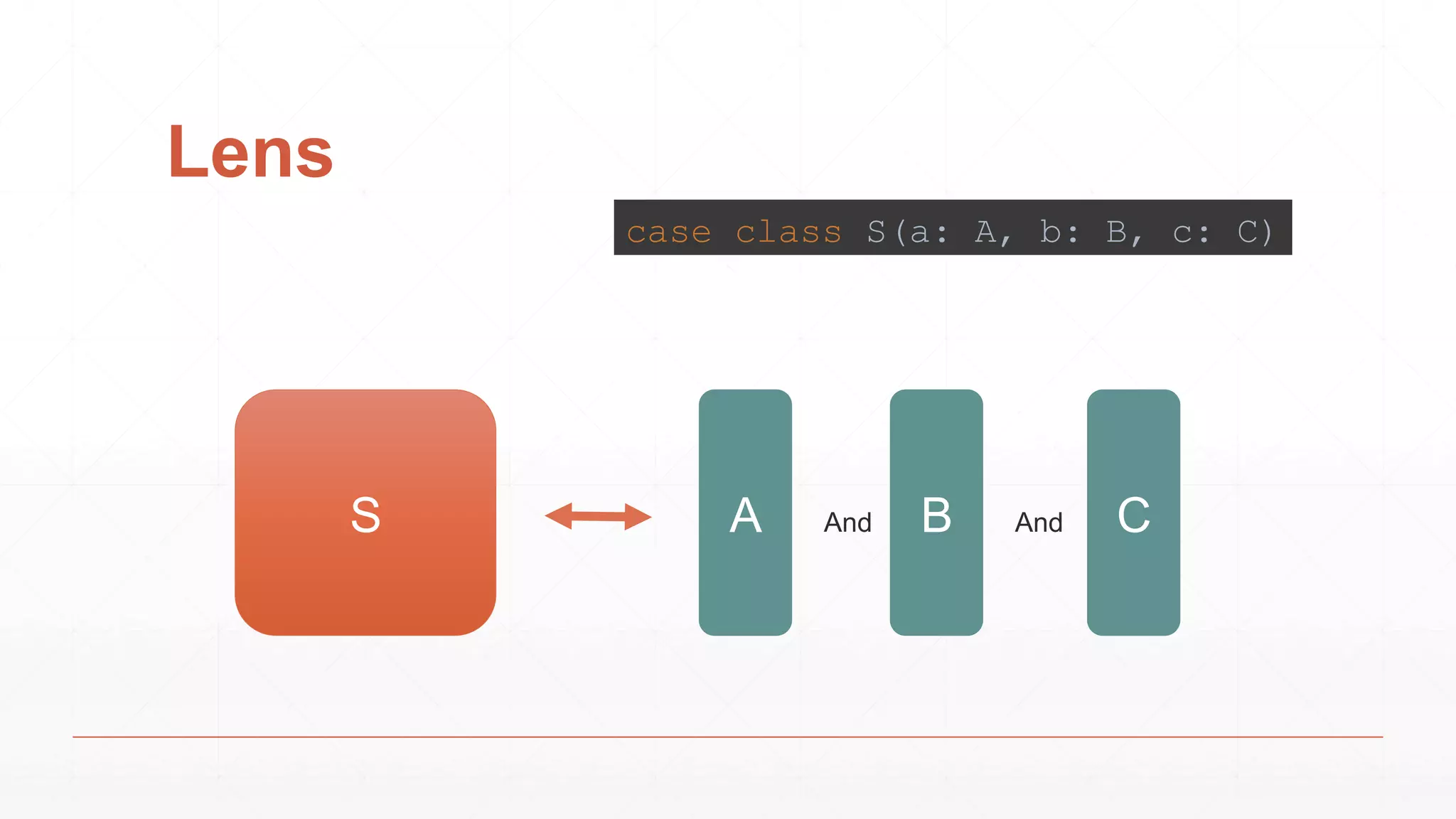
 => S
)
Properties:
For all s: S, set(get(s), s) == s
For all a: A, s: S, get(set(a, s)) == a](https://image.slidesharecdn.com/beyondscalalens-150312020754-conversion-gate01/75/Beyond-Scala-Lens-38-2048.jpg)
: Lens[S,A] =
Lens(
get = iso.get,
set = (a, _) => iso.reverseGet(a)
)](https://image.slidesharecdn.com/beyondscalalens-150312020754-conversion-gate01/75/Beyond-Scala-Lens-39-2048.jpg)
 => p.copy(age = a))
val zoe = Person(“Zoe”, 25)
age.get(zoe) == 25
age.set(20, zoe) == Person(“Zoe”, 20)
age.modify(_ + 1)(zoe) == Person(“Zoe”, 26)](https://image.slidesharecdn.com/beyondscalalens-150312020754-conversion-gate01/75/Beyond-Scala-Lens-40-2048.jpg)
![Nested Accessors
case class Person(name: String, age: Int, address: Address)
case class Address(streetNumber: Int, StreetName: String)
val address: Lens[Person, Address] = …
val streetName: Lens[Address, String] = …
val zoe = Person(“Zoe”, 25, Address(10, “High Street”))
(address compose streetName).get(zoe) == “High Street”
(address compose streetName).set(“Iffley Road”, zoe)
== Person(“Zoe”, 25, Address(10, “Iffley Road”))](https://image.slidesharecdn.com/beyondscalalens-150312020754-conversion-gate01/75/Beyond-Scala-Lens-41-2048.jpg)
![Tuples
def first[A,B]: Lens[(A,B), A] = …
def second[A,B]: Lens[(A,B), B] = …
val tuple = (2,“Zoe”)
first.set(4, tuple) == (4,“Zoe”)
second.modify(_.reverse)(tuple) == (2,“eoZ”)](https://image.slidesharecdn.com/beyondscalalens-150312020754-conversion-gate01/75/Beyond-Scala-Lens-42-2048.jpg)
![Universal Case Class Accessors
case class Person(name: String, age: Int)
val personToTuple: Iso[Person,(String,Int)] = …
val zoe = Person(“Zoe”, 25)
(personToTuple compose second).set(30, zoe)
== Person(“Zoe”, 30)](https://image.slidesharecdn.com/beyondscalalens-150312020754-conversion-gate01/75/Beyond-Scala-Lens-43-2048.jpg)
: Lens[Map[K,V], Option[V]] =
Lens(
get = m => m.get(k),
set = (optV, m) => optV match {
case None => m – k
case Some(v)=> m + (k -> v)
}
)](https://image.slidesharecdn.com/beyondscalalens-150312020754-conversion-gate01/75/Beyond-Scala-Lens-44-2048.jpg)
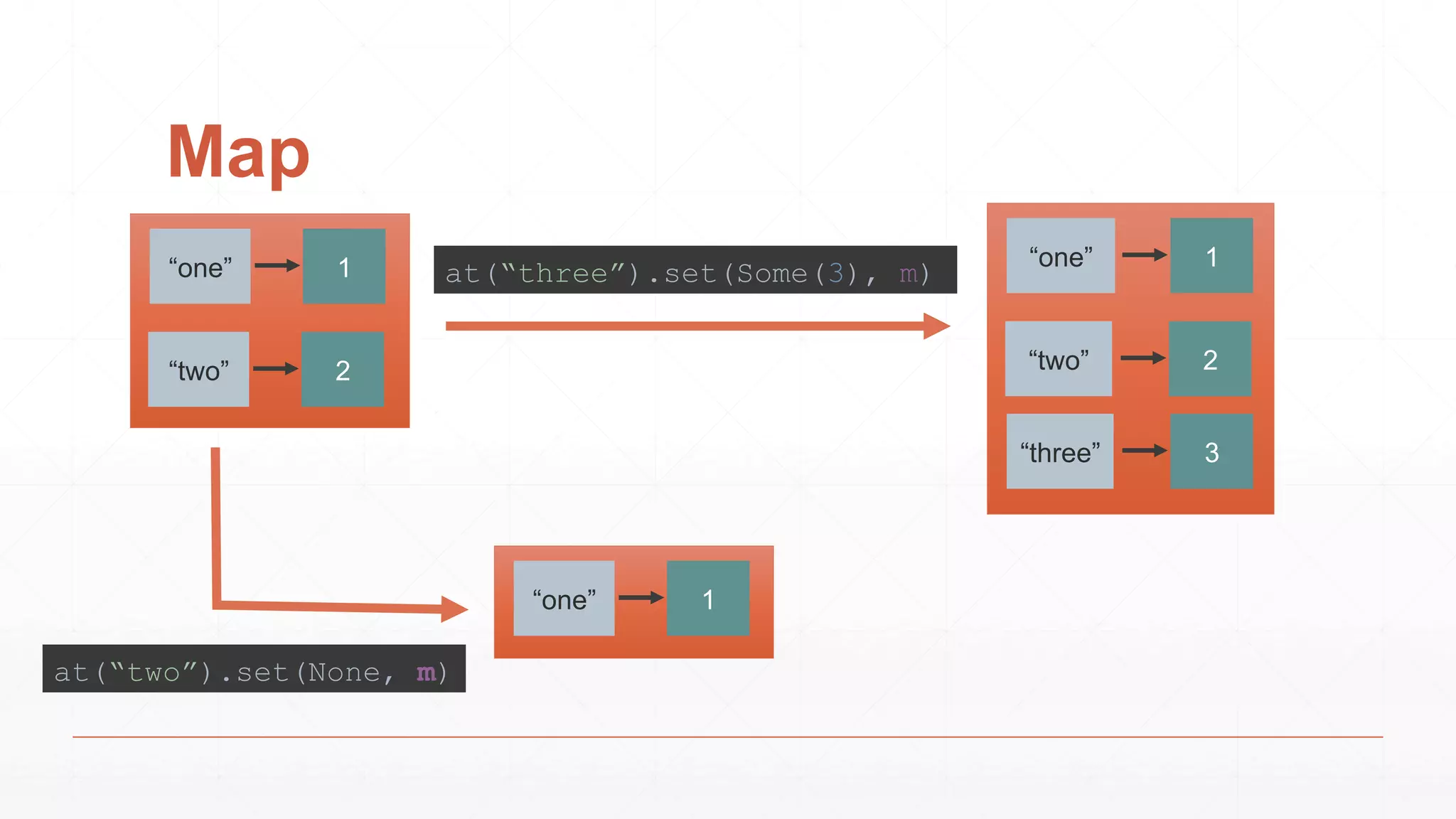
![What Next?
Optic f g
Iso S => A A => S
Prism S => Option[A] A => S
Lens S => A (A, S) => S](https://image.slidesharecdn.com/beyondscalalens-150312020754-conversion-gate01/75/Beyond-Scala-Lens-46-2048.jpg)
![Optional
Optic f g
Iso S => A A => S
Prism S => Option[A] A => S
Lens S => A (A, S) => S
Optional S => Option[A] (A, S) => S](https://image.slidesharecdn.com/beyondscalalens-150312020754-conversion-gate01/75/Beyond-Scala-Lens-47-2048.jpg)
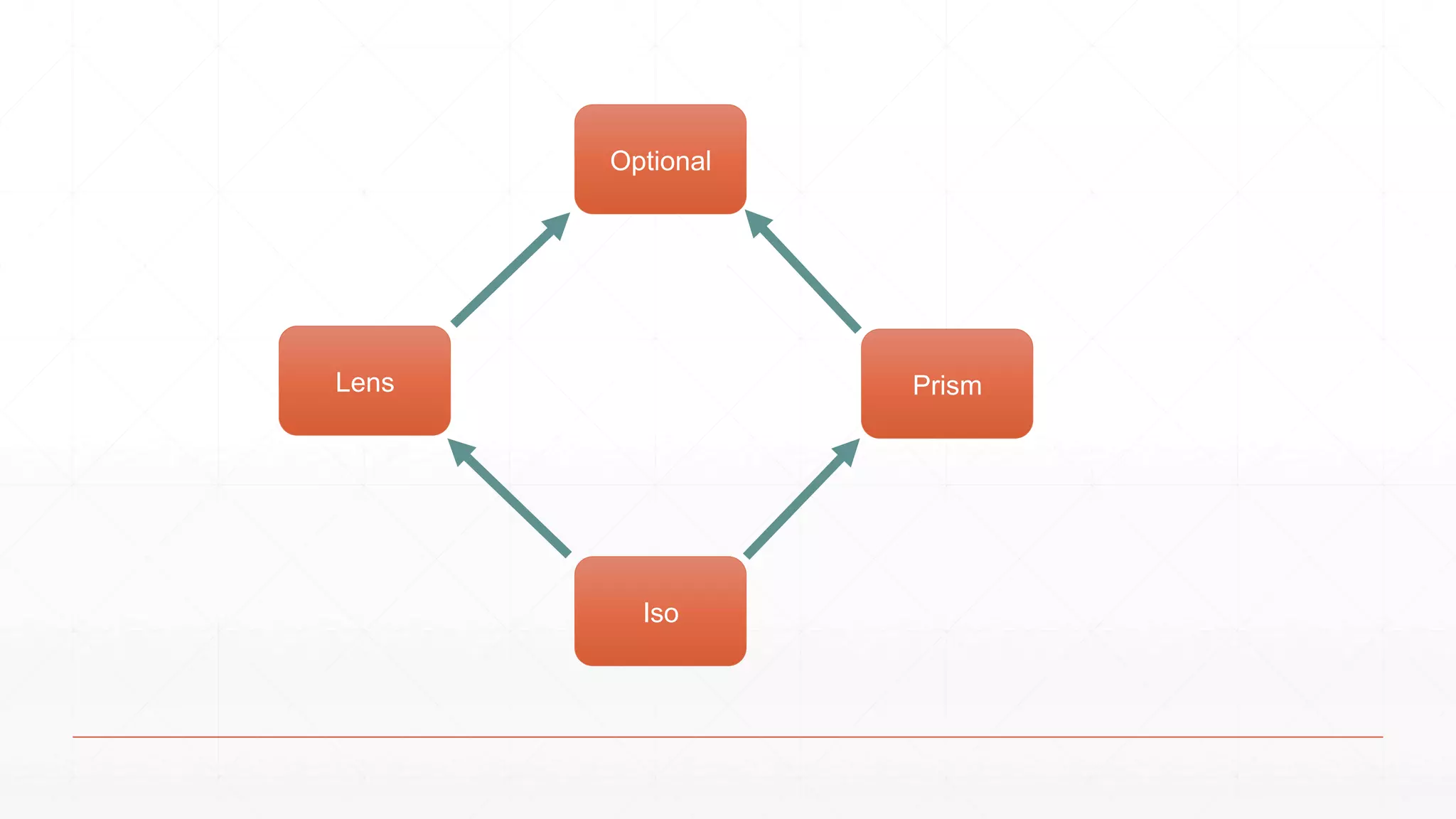
 => S
)
Properties:
For all s: S, getOption(s) map set(_, s) == Some(s)
For all a: A, s: S, getOption(set(a, s)) == Some(a) || None](https://image.slidesharecdn.com/beyondscalalens-150312020754-conversion-gate01/75/Beyond-Scala-Lens-49-2048.jpg)
![Head
def cons[A]: Prism[List[A], (A, List[A])] = …
def first[A, B]: Lens[(A, B), A] = …
def head[A]: Optional[List[A], A] = cons compose first
head.getOption(List(1,2,3)) = Some(1)
head.set(0, List(1,2,3)) = List(0,2,3)](https://image.slidesharecdn.com/beyondscalalens-150312020754-conversion-gate01/75/Beyond-Scala-Lens-50-2048.jpg)
![Void
def void[S,A]: Optional[S, A] =
Optional(
getOption = s => None,
set = (a, s) => s
)
void.getOption(“Hello”) = None
void.set(1,“Hello”) = “Hello”
void.setOption(1,“Hello”) = None](https://image.slidesharecdn.com/beyondscalalens-150312020754-conversion-gate01/75/Beyond-Scala-Lens-51-2048.jpg)
: Optional[List[A], A] =
if(i < 0) void
else if(i == 0) head
else cons compose second compose index(i – 1)
index(-1).getOption(List(1,2,3)) == None
index(1).getOption(List(1,2,3)) == Some(2)
index(5).getOption(List(1,2,3)) == None
index(1).set(10, List(1,2,3)) == List(1,10,3)](https://image.slidesharecdn.com/beyondscalalens-150312020754-conversion-gate01/75/Beyond-Scala-Lens-52-2048.jpg)
![Index for Vector
def vectorToList[A]: Iso[Vector[A], List[A]] = …
def indexV(i: Int): Optional[Vector[A], A] =
vectorToList compose index(i)](https://image.slidesharecdn.com/beyondscalalens-150312020754-conversion-gate01/75/Beyond-Scala-Lens-53-2048.jpg)
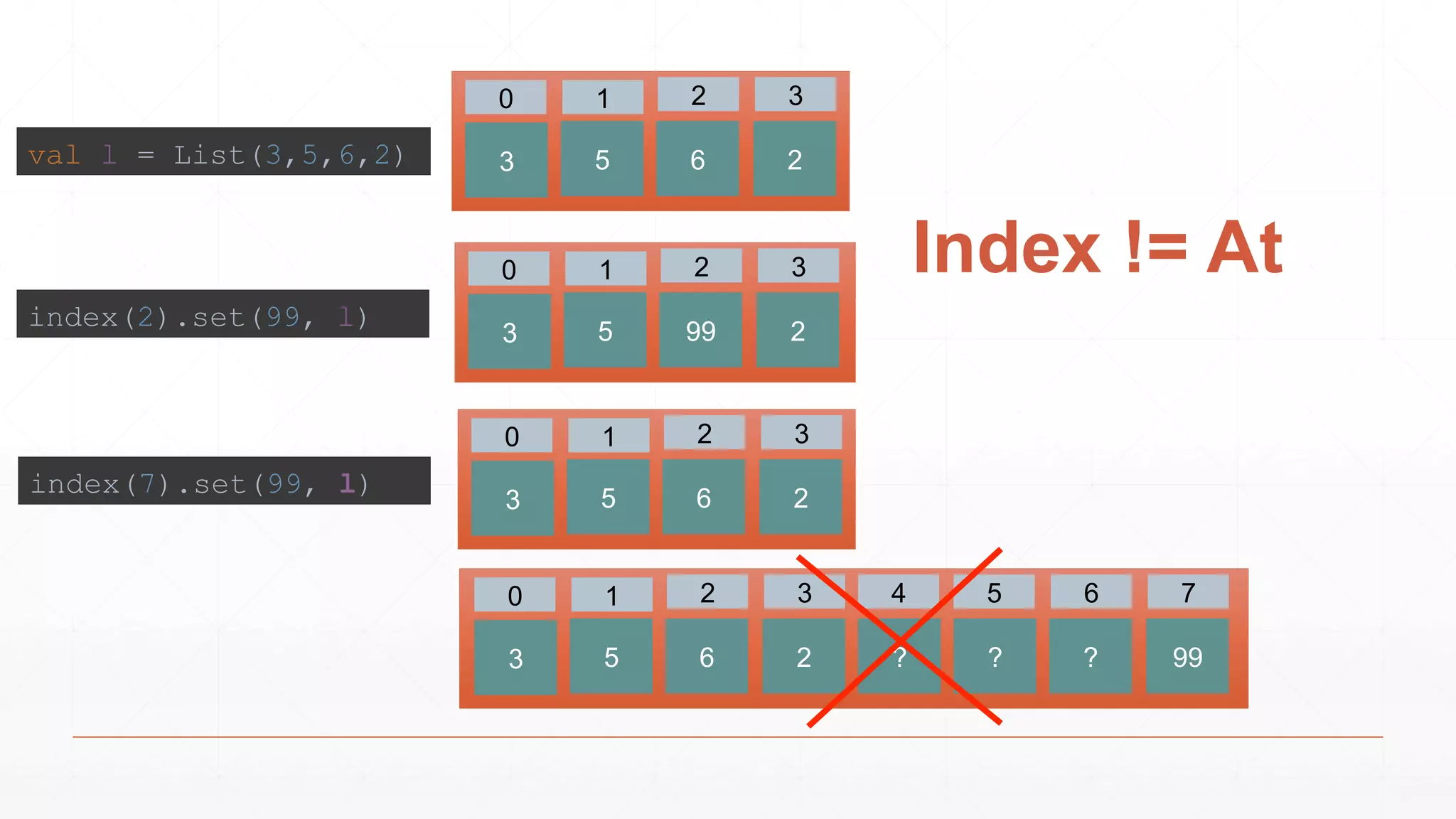
![Study Case: Http Request
sealed trait Method
case object GET extends Method
case object POST extends Method
case class URI(
host: String, port: Int,
path: String, query: Map[String, String]
)
case class Request(
method: Method, uri: URI,
headers: Map[String, String], body: String
)](https://image.slidesharecdn.com/beyondscalalens-150312020754-conversion-gate01/75/Beyond-Scala-Lens-55-2048.jpg)

![Which method?
val method: Lens[Request, Method] = …
val GET: Prism[Method, Unit] = …
method.get(r) // GET
(method compose GET).isMatching(r) // true](https://image.slidesharecdn.com/beyondscalalens-150312020754-conversion-gate01/75/Beyond-Scala-Lens-57-2048.jpg)
![How to update host?
val uri: Lens[Request, URI] = …
val host: Lens[URI, String] = …
(uri compose host).set(“foo.io”)(r)
Request(
method = GET,
uri = URI(“foo.io”,8080,“/ping”,Map(“age”->“15”)),
headers = Map.empty,
body = “”
)](https://image.slidesharecdn.com/beyondscalalens-150312020754-conversion-gate01/75/Beyond-Scala-Lens-58-2048.jpg)
![How to increase age query?
val query: Lens[URI, Map[String, String]] = …
(uri compose query compose
index(“age”) compose stringToInt
).modify(_ + 1)(r)
Request(
method = GET,
uri = URI(“localhost”,8080,“/ping”,Map(“age”->“16”)),
headers = Map.empty,
body = “”
)](https://image.slidesharecdn.com/beyondscalalens-150312020754-conversion-gate01/75/Beyond-Scala-Lens-59-2048.jpg)
![How to add header?
val headers: Lens[Request, Map[String, String]] = …
(headers compose at(“Content-Length”)).set(Some(“0”))(r)
Request(
method = GET,
uri = URI(“localhost”,8080,“/ping”,Map(“age”->“15”)),
headers = Map(“Content-Length”->“0”),
body = “”
)](https://image.slidesharecdn.com/beyondscalalens-150312020754-conversion-gate01/75/Beyond-Scala-Lens-60-2048.jpg)
